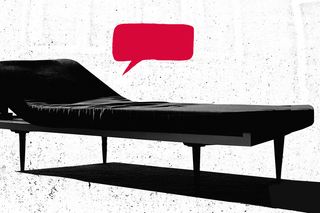
Mental Health Counselors Are Not Trained To View Sexuality Through A Sex‑Positive Lens In India. Here’s Why That Needs To Change.
Sexuality is either seen through the lens of traumas or disorders, or left unaddressed.

A “culture of silence” and an absence of social sanction to live our sexual identities — especially non-conforming, non-heteronormative ones – can significantly deter mental health and wellbeing. Dealing with concerns around sexuality is therefore a staple of being a therapist/counselor. However, like everyone else, counselors are also influenced and shaped by the society around them and therefore, the ability of counselors to create a safe, affirmative and empathetic environment is influenced by their own views on sexuality.
A pathogenic mentality permeates when and how many counselors might discuss sexuality within the therapy space — it often doesn’t come up unless there is a problem with or around it. Far from engaging in affirmative dialogue, counselors either talk about sexuality through the limited lens of diagnostic categories — traumas, disorders, dilemmas and the like — or for the most part leave sexuality unaddressed.
Affirmative dialogue involves language that is not just neutral but sex-positive; that not just accepts sexuality but instead promotes conversation around pleasurable sexuality. Numerous studies, including an exploratory study I completed, point to three key factors that might explain why there is a severe lack of affirmative dialogue in the mental health space when it comes to sexuality.
Incomplete Training on Issues Regarding Sexuality
In my study, a sizeable portion of counselors (35.48%) admitted to not having received any training on sexuality throughout their formal education, and a small portion (12.90%) admitted to not receiving any training on such issues even during their work experience. Disappointingly, even the sexuality education counselors receive is delivered from the standpoint of health and disease, and not from a sex-positive, pleasure-focused lens. There is a conspicuous absence of training on sexual expression, reproductive health, and sex therapy. Female counselors often report being taught only about menstruation, and sometimes, the only training on sexuality occurrs, disturbingly, within a ‘Moral Science’ class.
These findings, though disappointing, were resonant with my own schooling experiences, and also with the continuing debate around sexuality education in schools. During graduation, sexuality was a part of basic psychological courses and never explicitly focused upon. As a trainee mental health practitioner, it was only through an “out-of-syllabus” e-learning course on sexuality that I was exposed to new perspectives that challenged my beliefs. Affirmation of sexuality did not emerge as the prime focus of formal psychotherapeutic training.
Related on The Swaddle:
How Marriage Counseling in India Can Enforce Unequal Gender Roles
This experience is similar to experiences counselors report around the world. For instance, a recent study surveyed representatives from 38 doctoral programs in counseling psychology in the United States and found that comprehensive training in sexuality was offered only by a few programs. For instance, only 15.8% of respondents surveyed reported that their training program covered sexual pleasure.
Disparate Definitions of Sexuality
Counselors’ definitions of sexuality reflect their understanding of the concept. These meanings not only influence counselors’ interventions with clients, but also shape whether and how they talk about sexuality with their colleagues. The absence of a shared definition of sexuality can contribute to the lack of an affirmative dialogue within the domain of psychotherapy.
Within my study, counselors, generally, had a purely biological or psychological understanding of sexuality, with some even conflating the concepts of gender and sexuality. In a few cases, though, responses conveyed a more holistic understanding of sexuality as being about an individual’s identity and not just about sex. A 36-year-old counselor, for instance, defined sexuality as being inclusive of “my values, attitudes, way of life, way of life, looking at myself as a whole beyond my body, gender, and genitalia.”
These variations in counselors’ conceptualization of sexuality are indicative of the diversity in their orientation and training. These conceptualizations may be also shaped by a range of other factors, ranging from socialization to counselors’ own experiences of sexuality, and most importantly, counselors’ experience of conversation around sexuality within the therapy space. This also means that counselors who define sexuality in broader, more affirmative terms, are likelier to afford their clients space for a fuller expression of sexual identity, and vice versa.
This lack of a standardized definition or best practices around sex positive therapeutic conversation often also affects client referrals for therapists. In other words, therapists are sometimes likelier to refer clients to those therapists who most closely reflect their own definitions of and ways of working with sexuality.
Sexuality Viewed from the Lens of Pathology
The current norm within the mental health space is to associate sexuality with the pathological issues surrounding it. For instance, counselors who work with children deal with issues such as children witnessing their parents having intercourse and experimentation in adolescents. Otherwise, sexuality only comes up when counselors are working with individuals who have experienced rape and other forms of sexual harassment.
As a result, the language used by counselors in discussing sexuality is often skewed unfairly by this pathological lens. This means that there is limited conversation about affirming sexuality or sexual pleasure. Even within the safe space of counseling, a word cloud around sexuality would probably be dominated by pathological terms rather than positive or pleasure-oriented discussions. This, although not unexpected, is still problematic and, once dissected, points to larger socio-educational factors within our profession itself.
Related on The Swaddle:
When affirmative conversation around sexuality does come up, it mostly does so within the context of discomfort or distress. Furthermore, when the views of the clients on sexuality are already colored by their distress or discomfort around it, there are only so many affirmative dialogue counselors one can have with them. This makes the job hard even for those who are acutely aware of the need to do otherwise.
There is a severe need for formulating clear codes of conduct for counselors working with issues of sexuality as well as the provision of training on these concerns within counselor education programs. Most importantly, there is a pressing need for Indian counselors to first acknowledge the lack of affirmative sexuality as part of their regular training and then actively seek out such training. A conscious effort must be made to include conversations around the same as part of their practice. Not doing so will ensure that we continue to either ignore sexuality, or view it through the lens of issues to be fixed.
Shivangi is a mental health professional with a post-graduate degree in Clinical Psychology from TISS, Mumbai. Currently, she is pursuing a doctoral degree in Human Development at Virginia Tech. Shivangi heads AeSha for Friendships Foundation, a Delhi-based non-profit that works with women experiencing intersectional marginalization.
Related


Why Do We Have Pubic Hair?
